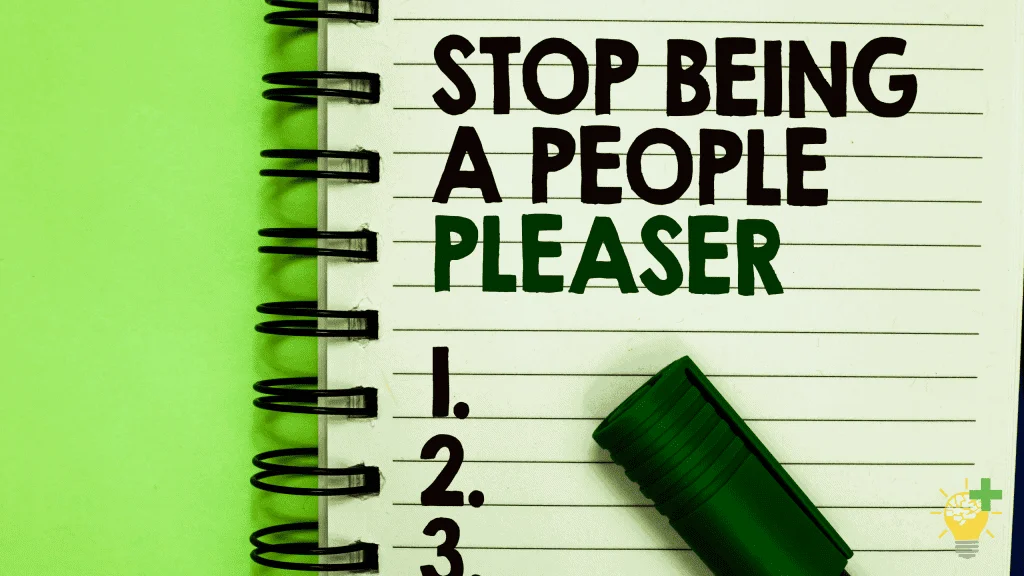You’re a tad curious about whether you’re a people pleaser and how it’s impacting your self-esteem. Fortunately, you’ve come to the right place. In this guide, you’ll gain an in-depth understanding of the issue do people pleasers have low self-esteem and the steps you can take to eliminate your people pleasing tendencies. However, we’ll begin by defining people-pleasing and how it can take a toll on your self-esteem.
People pleasers usually have low self-esteem as they might put their needs on the back burner to help others. Consequentially, that leads to anxiety, depression, and frustration. Therefore, a people pleaser must strike the perfect balance between helping others and self-care to build esteem.
What Are the Main Reasons for Becoming a People Pleaser?
In your childhood, there’s a high likelihood that you sought the approval of your guardian or parents, and when you did something they disagreed with, you felt the wrath of their anger. That’s where people pleasing stems from. Many people spend their lives trying to please others, which takes center stage in their lives.
Those with low self-esteem and people pleasing tendencies at work may take on too much work to please their boss or other staff members. Research shows that workaholics and people pleasing stem from low self-esteem. That’s because they desperately seek the approval of others to diminish the pain they feel as a result of their low self-esteem.
While this might be why some are people pleasers, the effectiveness of this strategy isn’t clear, and how long the perks last.
The book ‘Who’s Pulling Your Strings?’ by Harriet Braiker explains that many people believe their self-esteem is based on how helpful and kind they see. They pressure themselves to make others happy at the expense of self-care. That means they put the needs of others above theirs which comes with adverse repercussions.
Do People Pleasers Have Low Self-Esteem?
People pleasing tendencies take a toll on your self-esteem. For starters, by ignoring your needs and wants, you’ll undoubtedly feel like a victim. The key to avoiding the victim mentality is to strike a balance between your wishes and those of others.
When there’s an imbalance, you start feeling like your entire life is controlled by the need to please everyone, which leads to profound unhappiness and stress. These are the ingredients for low self-esteem.
If you have this problem and want to break free from it, you need to be proactive and take control of your life. A great starting point would be to reflect on the real reasons behind wanting to be liked by everyone.
Furthermore, ask yourself whether it’s possible for everyone to like you. You’ll realize you’re not everyone’s cup of tea which means you shouldn’t strive to be liked by everyone.
When your goal is to please others, particularly from childhood, learning to say no and stand up for yourself is no easy feat. When you try to say no, the guilt eats you up. Perhaps you believe that a good person is selfless, always putting others’ needs and wants before yours. While there’s truth to that, it’s relative. If you want to become a saint, you have free rein to do so.

However, it’s worth noting that you can find a balance whereby you’re considerate of others but prioritize your wellbeing. After all, you cannot pour from an empty cup. That means you can’t help others, for instance, by being their support system if you’re struggling mentally and emotionally.
Self-esteem encompasses self-value and being a best friend to you. Furthermore, it involves weighing your needs against others and understanding that it’s impossible to please everyone. At that point, guilt won’t haunt you.
Self-care practices are paramount to your self-esteem. One of the most crucial factors on your self-esteem is stress. For that reason, it’s not surprising that most people are constantly searching for ways to alleviate stress and restore balance in their lives. That is conducive to higher self-esteem.
One of the surefire ways of diminishing stress is valuing your time. Most stressors stem from the frustration of being unable to manage time pressure effectively. With that in mind, it’s common for people to focus on strategies to overcome procrastination and adopt effective time management skills. However, one of the greatest challenges in people pleasing is prioritizing your time.
A people pleaser typically doesn’t value their time, allowing it to be easily consumed by others. There’s no denying that taking the time to help others is an act of service but in moderation. If you devote all your time to helping others, you’re left feeling emotionally, mentally, and perhaps physically exhausted. When you neglect your needs and put others first, you unknowingly lower your self-esteem.
People pleasing throughout will generate a victim mentality that doesn’t serve you and others. Believing that you’re a victim means that you’ll harbor resentment even when you do things for others, especially when the favor isn’t returned. That triggers low self-esteem. The viable solution to this problem is to get rid of the victim mentality and learn to say no.
Remember, putting your needs first isn’t selfish because failure to take care of yourself means you can’t be a supportive and amazing parent, friend, husband, partner, wife, or colleague. Once you learn to stand up for yourself, you’ll notice a significant boost in self-confidence after a while. Unwavering confidence is one of the signs of high self-esteem.
Nevertheless, many people pleasers go to the extreme when it comes to standing up for themselves and saying no. Balance is the key. While you shouldn’t put others’ needs before yours, that doesn’t mean you pull a 180 and become overly selfish by ignoring others entirely.
Recognizing the Signs
If you’re uncertain whether or not you’re a people pleaser, we’ve rounded up a few telltale signs.
1. You Have Low Self-Opinion
We’ve established people pleasers typically deal with low self-esteem and derive their self-worth from the approval of others. Therefore, you might believe that your worth is tied to your usefulness to others. Furthermore, their appreciation and praise are needed for you to feel worthy, loved, and valued.
2. You Want Everyone to Like You
People pleasers typically spend most of their time worrying about rejection. These worries trigger particular actions to keep people happy and avoid rejection. Moreover, you may have the burning desire to be needed and believe that you are more likely to receive affection from those who need you.
3. It Is Nearly Impossible to Say No
You might worry about turning down a request for help or saying no because you believe you’ll be perceived as heartless. Although consenting to their requests might seem like a safer bet even when you don’t have the inclination or time, this pattern can cause issues because it shows people that their needs come before yours.
A great example is agreeing to help someone move homes even when you have a tight work deadline. Typically, people abuse this privilege by repeatedly ignoring your boundaries because they know you won’t turn down their requests.
4. You Accept Responsibility or Apologize for Things That Are Not Your Fault
If you’re always ready to apologize when something goes wrong, you’re a people pleaser. The tendency entails a readiness to take on blame for circumstances that don’t involve you.
For instance, your boss sends you to get pasta for lunch at a local restaurant that ends up confusing your order. You take the blame even though it wasn’t your fault that the restaurant mixed up the food.
You apologize repeatedly and get anxious that your boss will fire or suspend you and that you’ll never be trusted with a lunch order again.
5. You’re Quick to Say Yes When You Want to Say No
In the mind of a people pleaser, agreeability is a surefire way to garner approval. For instance, when a co-worker presents their idea for an upcoming project at the weekly team meeting, you quickly agree and go along with it to keep the peace rather than point out the clear flaws.
By doing so, what you may not realize is that you’re setting yourself up for frustration in the future when your boss turns down the project and requires a re-do. By not speaking up and sharing your point of view, you’re doing a disservice to everyone.
6. You Struggle With Authenticity
A people pleaser typically faces challenges in recognizing their true feelings. Continuously putting your needs on the back burner makes it more difficult to acknowledge them. In the end, you might be unsure about your needs, wants, and how to be embrace self-authenticity.
Furthermore, you might not voice feelings you’re aware of even when you need to speak up. For instance, you might refrain from voicing to your partner something they said that made you feel bad by convincing yourself that they didn’t mean it in the way you interpreted it.
That’s because you’re afraid of a disagreement that may ensue. While you might have misinterpreted what your partner said, you won’t know until you discuss it.
7. You’re a Giver
If the thought of being liked by everyone sparks a smile, then you’re a people pleaser. For that reason, people pleasers are givers. They make sacrifices to feed their sense of self, leading to martyrdom. You might give endlessly hoping that the takers will reciprocate your actions with the love and affection you desire.
8. You Lack Free Time
Being busy doesn’t imply you’re a people pleaser. However, you’re a people pleaser if you take care of essential responsibilities such as childcare, work, and household chores without making time for your hobbies. You should always carve out time for self-care to feel rejuvenated.
9. Conflict Upsets You
People pleasing usually entails the crippling far of conflict because your goal is to keep the peace. Therefore, you interpret conflict as the failure to please people. To avoid discomfort after conflict or disagreement, you might be quick to apologize or make gestures that will make people happy even when they’re not upset with you.
You may fear conflict that doesn’t involve you. For instance, if two of your friends disagree, you may step in to offer advice on repairing the situation for reconciliation. In doing so, you hope they’ll think positively of you for facilitating the reconciliation.
How to Stop People Pleasing

Now that you know the traits of a people pleaser, let’s discuss a few ways you can avoid your people pleasing tendencies.
Self-Awareness
It’s the first step towards breaking the people pleasing cycle. When you understand your needs and wants, you can prioritize them to create balance in your life. Your focus will shift from putting the needs of others first because you have yours to meet.
Self-Love
As a people pleaser, it’s a no-brainer you’ve been seeking the approval of others and going out of your way to make everyone but yourself happy. By slowly building a relationship with yourself through self-love, you can focus on doing things to please yourself rather than others.
You’ll eliminate the need to seek approval from others and learn to love and accept yourself more. Resultantly, you’ll develop high self-esteem.
Be Your Best Friend
You’ll require prioritizing self-care, which begins with self-acceptance. Be content with the person you are and learn to enjoy your company by doing the things that make you happy. For instance, you can take yourself on coffee dates, travel, lunch, or dinner dates. You won’t seek validation from others, and your people pleasing tendencies will end.
Set Boundaries
You’ll know where to channel your time and energy by deciding what your priorities are. You’ll have the power to say no to others without feeling guilty. By giving other people limits, you can fulfill your needs and strike a balance between helping others and saying no. By setting boundaries and sticking to them, others will learn to respect you.
The Bottom Line
Although people pleasing behavior might seem like a positive trait, it does a disservice to you in the long run as it takes a toll on your self-esteem. Trying to keep everyone happy leaves you feeling drained. If you’re struggling to break your people pleasing habits, therapy can be your Holy Grail.




